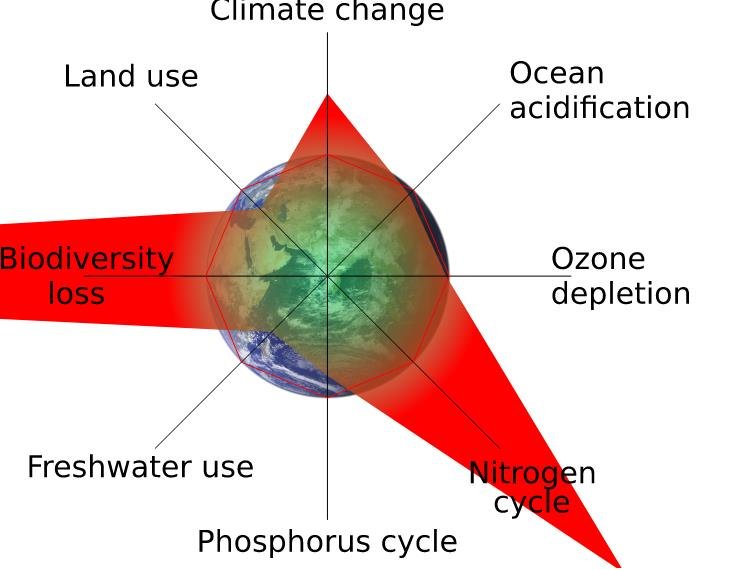In a stark warning, scientists have revealed that Earth has exceeded six of the nine planetary boundaries essential for maintaining a stable and habitable environment. These boundaries, which include climate change, biodiversity loss, and freshwater use, are critical indicators of the planet’s health. The findings, published in the journal Science Advances, highlight the urgent need for global action to mitigate human impact on the environment. The study underscores the interconnectedness of these boundaries and the potential for irreversible changes if current trends continue.

The Concept of Planetary Boundaries
The concept of planetary boundaries was introduced in 2009 by a group of scientists led by Johan Rockström and Will Steffen. These boundaries define the safe operating space for humanity, within which the Earth’s systems can function without significant disruption. The nine boundaries include climate change, biosphere integrity, land-system change, freshwater use, biogeochemical flows (nitrogen and phosphorus cycles), ocean acidification, atmospheric aerosol loading, stratospheric ozone depletion, and the introduction of novel entities (such as plastics and synthetic chemicals).
The recent study reveals that six of these boundaries have been crossed due to human activities. These include climate change, biosphere integrity, land-system change, freshwater use, biogeochemical flows, and novel entities. The crossing of these boundaries indicates that human activities are pushing the Earth system beyond its stable state, increasing the risk of severe environmental degradation and potential collapse of ecosystems.
The study emphasizes that while crossing these boundaries does not guarantee immediate disaster, it significantly raises the risk of catastrophic changes. For example, the loss of biodiversity can lead to the collapse of ecosystems that provide essential services such as pollination, water purification, and climate regulation. Similarly, excessive nitrogen and phosphorus runoff from agriculture can cause dead zones in oceans and freshwater bodies, disrupting aquatic life and food chains.
The Impact of Human Activities
Human activities are the primary drivers of the transgression of planetary boundaries. Industrialization, deforestation, urbanization, and intensive agriculture have all contributed to the degradation of the Earth’s systems. The burning of fossil fuels has led to unprecedented levels of greenhouse gases in the atmosphere, driving climate change and causing global temperatures to rise. This, in turn, has led to more frequent and severe weather events, melting ice caps, and rising sea levels.
Deforestation and land-use change have resulted in the loss of habitats and biodiversity. Forests, which act as carbon sinks, are being cleared at an alarming rate for agriculture, mining, and urban development. This not only releases stored carbon into the atmosphere but also reduces the planet’s capacity to absorb carbon dioxide, exacerbating climate change. The loss of biodiversity also means the loss of species that play crucial roles in maintaining ecosystem balance.
The overuse and pollution of freshwater resources are also of great concern. Agriculture, industry, and domestic use have led to the depletion of freshwater sources, while pollution from chemicals, plastics, and waste has contaminated rivers, lakes, and aquifers. This has severe implications for human health, food security, and the survival of aquatic ecosystems. The introduction of novel entities, such as microplastics and synthetic chemicals, further compounds these issues, as their long-term effects on the environment and human health are still not fully understood.
Urgent Need for Global Action
The findings of the study highlight the urgent need for coordinated global action to address the transgression of planetary boundaries. Scientists call for immediate and sustained efforts to reduce greenhouse gas emissions, protect and restore biodiversity, manage land and water resources sustainably, and reduce the introduction of harmful substances into the environment. This requires a fundamental shift in how societies operate, moving towards more sustainable and equitable systems.
International cooperation is crucial in this endeavor. Governments, businesses, and civil society must work together to implement policies and practices that prioritize the health of the planet. This includes transitioning to renewable energy sources, promoting sustainable agriculture and forestry practices, reducing waste and pollution, and protecting natural habitats. Public awareness and education are also essential to drive behavioral changes and support for environmental initiatives.
The study also underscores the importance of scientific research and monitoring to track the state of the Earth’s systems and assess the effectiveness of interventions. Continued investment in science and technology is needed to develop innovative solutions to environmental challenges and to inform policy decisions. By working together, humanity can navigate the complex and interconnected challenges of the 21st century and ensure a sustainable future for generations to come.
















